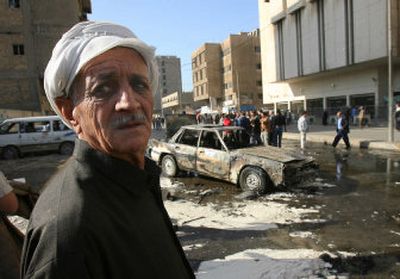Amid security debate, 159 die

BAGHDAD, Iraq – The Shiite prime minister promised Sunday to reshuffle his Cabinet after calling lawmakers disloyal and blaming Sunni Muslims for raging sectarian violence that claimed at least 159 more lives, including 35 men waiting to join Iraq’s police force.
Among the unusually high number of dead were 50 bodies found behind a regional electrical company in Baqouba, 35 miles northeast of Baghdad, and 25 others found scattered throughout the capital. Three U.S. and four British troops were reported killed.
Also Sunday, the country’s Sunni defense minister challenged Prime Minister Nouri al-Maliki’s contention that the U.S. military should quickly pull back into bases and let the Iraqi army take control of security countrywide.
Defense Minister Abdul-Qadir al-Obaidi rejected calls by al-Maliki for the U.S. military to speed transfer of security operations throughout the country to the Iraqi army, saying his men still were too poorly equipped and trained to do the job.
“We are working hard to create a real army and we ask our government not to try to move too quickly because of the political pressure it feels. Our technical needs are real and that is very important, if we are to be a real force against insecurity,” al-Obaidi said.
Al-Maliki wants the Americans confined to bases for him to call on in emergencies, but he boldly predicted his army could crush violence within six months if left alone to do the work.
Key lawmakers from al-Maliki’s Islamic Dawa Party said that in the coming Cabinet shake-up, which the prime minister promised during a closed-door parliament session Sunday, Interior Minister Jawad al-Bolani was at the top of the list to lose his post because police and security forces were failing to quell the sectarian killing that has reached civil war proportions in Baghdad and the center of the country.
Al-Bolani, a Shiite who was chosen in June and a month after al-Maliki’s government was formed, is an independent. The United States demanded that the defense and interior posts be held by officials without ties to the Shiite political parties that control militia forces.
Al-Maliki is under pressure from his people and the U.S. to curb violence, with Washington leaning on him to disband Shiite militias believed responsible, through death squads, for much of the killings.
Al-Maliki is dependent on both the Supreme Council for the Islamic Revolution in Iraq, with its Badr Brigade military wing, and radical Shiite cleric Muqtada al-Sadr’s political movement for his hold on power.
After nearly 48 hours without reporting a death, the U.S. military said three soldiers assigned to the 1st Brigade, 1st Armored Division died Saturday of combat wounds in Anbar Province, the insurgent stronghold west of the capital. Four British servicemen were killed in an attack on a patrol boat in Basra’s Shatt al-Arab waterway, southern Iraq, the Ministry of Defense said in London.
In Sunday morning’s bombing targeting police recruits, two men detonated explosives strapped to their bodies simultaneously, police Lt. Maitham Abdul-Razaq said.
In Baqouba, the Iraqi army’s provincial public affairs office said troops found 50 bodies dumped behind the offices of the provincial electric company.
Nineteen bodies were taken to the morgue and the army was waiting for U.S. bomb disposal teams, fearing the 31 other bodies were rigged with explosives.